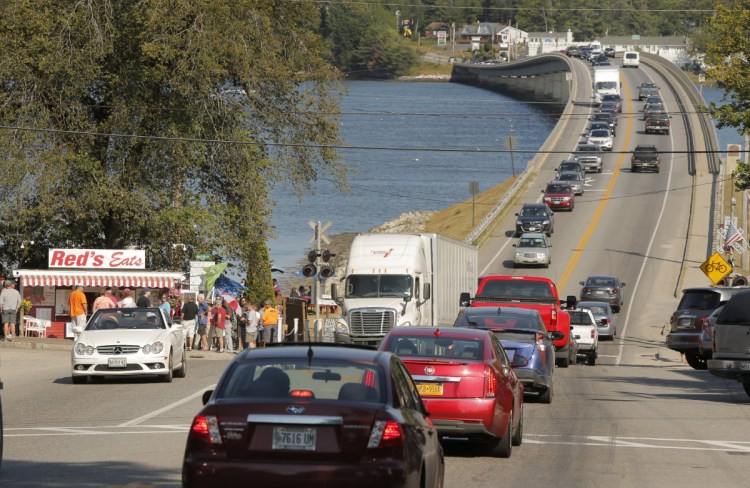WISCASSET — The board of selectmen met this week to officially drop Wiscasset’s lawsuit against the Maine Department of Transportation, but it did not address questions about the legal fees the town has incurred and whether it will accept private funds to help pay them.
An overwhelming majority of residents voted April 17 to end the town’s lawsuit over the state’s plan to ease traffic flow in the historic village. On Tuesday, the board voted 4-1 to drop the lawsuit without prejudice.
Board member Katherine Martin-Savage voted against the measure, saying she wanted to wait until a Portland judge ruled on a motion for a preliminary injunction before ending the suit. Selectman Ben Rines, a staunch advocate of the lawsuit, said the people spoke loudly at the ballot box last week and awaiting a ruling that may never come “just drags out the process.”
The board did not address what is perhaps the biggest question related to the dispute: How the town will pay for as much as $100,000 in legal fees accrued since suing the transportation department in November. Members of the select board have been quiet ever since Ralph Doering III offered to foot the bill for the town’s legal costs. Doering set aside $75,000 in an escrow account, but he said he has not received any response from selectmen or the town manager since he sent a letter to the town in January.
“The silence of town leaders on the offer to pay all legal fees mirrors the town’s response to an offer Doering made in 2017, on at least three separate occasions, to have a traffic engineering expert present his findings about the MDOT plan to the Wiscasset Select Board,” said Mark Robinson, who represents Doering. “On each occasion, the offer was met with silence from the select board and the town manager.”
Town Manager Marian Anderson said the town has paid Murray, Plumb & Murray $53,446.47 for legal services billed in November, January and February.
There are still outstanding bills for services rendered in March and April, which are expected to push the cost closer to $100,000. The town is awaiting those bills.
Anderson said the board of selectmen will discuss the next steps once all the bills are received, and there would have to be a special town meeting if the board requests additional funds.
The town paid $20,000 in legal fees from the contingency account and the remaining balance from the contracted services account. The board has had no other discussions on accepting the funds offered by Doering other than to state that it would not accept the funds without residents’ approval.
Residents have been vocal about whether it is appropriate for the town to accept private funds for a lawsuit filed by the town. Wiscasset Thinks Forward, a community group that was vehemently opposed to the lawsuit, took an official position against accepting money from outside sources.
Lonnie Kennedy-Patterson, the group’s unofficial spokesperson, said the group would like to see selectmen withdraw money from the town’s investment account to cover the legal fees. “Our position is that although it is legal to take the donated money, it is highly unethical,” she said.
Seaver Leslie, a Wiscasset resident, said it’s unfortunate that the town decided against accepting Doering’s offer. The town had a good chance to win its lawsuit, he said, which would have put “us in a strong position to negotiate” with the transportation department.
“Dropping the suit doesn’t end Wiscasset’s need to work with MDOT to design a traffic solution that improves flow and safety, and also protects small businesses and the historic character of the village,” Leslie said.
Judy Colby, chairwoman of the board, hopes things will improve moving forward, both with the DOT and Wiscasset residents.
“We need to go to MDOT again and at least have our voices heard,” Colby said. “They may not listen, but I think that’s important.”
There is nothing that legally states that the DOT must work with Wiscasset following the dismissal of the suit. The department, if it chooses, could move forward with the project as proposed without answering to Wiscasset.
But transportation department spokesman Ted Talbot said once the lawsuit is formally dismissed, the DOT “looks forward to working with the town on this regionally significant project.”
The department and the town disagree about whether the state’s plans for realigning traffic and parking must comply with the town’s historic preservation ordinance and require a town permit.
The state’s latest plan was unveiled two years ago and promised to improve traffic flow by adding two traffic lights and curb extensions in the village and removing parking on Main Street and side streets.
Talbot said bids were opened last week and contracts are typically awarded within 30 and 60 days. He said construction would likely start this June and be completed in June 2019.
Send questions/comments to the editors.


